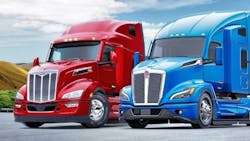Paccar executives confident they’ll make more share gains
Paccar CEO Preston Feight sounded as confident about outmuscling competitors as you’re likely to hear a public company executive get.
“We’re continuing to demonstrate that our business is structurally stronger, that the margins are higher, that our market share is increasing in the U.S. and Canada, both in heavy-duty and medium-duty,” Feight said on an April 30 conference call discussing Paccar’s first-quarter results. “So we feel good about the way the market is going for Paccar.”
Feight, who has been with Paccar since 2008 and has led the company since 2019, was responding to a request for context around his team’s 2024 deliveries forecast despite having lowered its estimate for the overall U.S./Canadian market for heavy-duty trucks by 10,000 units (to between 250,000 and 290,000) since early this year. He and CFO Harrie Schippers laid out the situation as they see it: Paccar is already filling third-quarter build slots, inventories remain in fine shape, and the company is taking market share: Its Kenworth and Peterbilt brands accounted for 30.3% of first-quarter Class 8 sales, up nearly a point from a year earlier.
In all, Bellevue, Washington-based Paccar delivered 48,100 trucks in the first quarter. That was down from the bumper 51,100 of early last year but up from 43,000 in Q1 of 2022. European deliveries fell notably, but Paccar moved 29,500 units in the United States and Canada, compared to 26,000 in the previous year. Schippers said his team is forecasting 48,000 total shipments in the second quarter with little change in the geographic mix.
Feight said the weak truckload market was the main driver behind the slightly lower 2024 Class 8 sales outlook. He said that customers are balancing the need to keep buying trucks to refresh their fleets with the market softness expected to continue for several quarters.
See also: Paccar CEO: We’re not seeing a North American slowdown
Daimler Truck sees strong North American growth in 2024
The leaders of Daimler Truck Holding on May 3 also reported good North American activity in Q1 but weaker numbers in international markets in Germany and Asia. Daimler sold a little more than 46,200 units in the first quarter in North America—the company includes Mexico, whereas Paccar does not—which was down 5% from early 2023. However, revenue in the region was flat at about $6.25 billion thanks to higher pricing and a mix that leaned slightly more toward more expensive units. That helped lift Daimler Truck North America’s earnings before interest and taxes by 7% to $780 million.
Daimler Truck CEO Martin Daum and his team told investors they, like Paccar’s leaders, expect second-quarter sales to be about the same as Q1’s. They still expect North American market sales to be between 280,000 and 320,000 for the year, but Daum said they’re also mindful of growing uncertainty globally.
“We certainly do not get carried away by our recent successes,” Daum said. “We are well aware that our market environment has become more volatile and that the number of risks has increased. We, therefore, keep moving forward with confidence but also with prudence.”
Daum added that all three segments of Daimler Truck North America—heavy-duty, vocational, and medium-duty—are showing solid order activity through the rest of the year and added that the recently-concluded contract talks with the United Auto Workers means his team will be able to meet that demand. Daimler Truck North America produces Freightliner and Western Star trucks here. Daimler Truck also entered the medium-duty electric truck market last year with Rizon, which produces cabover Class 4 and 5 trucks in Japan for the North American fleet market.
“We’re still producing at full speed in the United States,” Daum said. “At the moment, we like the balance of products.”
Shares of Paccar (Ticker: PCAR) fell more than 6% after Feight and Schippers announced earnings but have held their ground since around $105. Over the past six months, they are still up about 25%, which has grown Paccar’s market capitalization to more than $55 billion.
About the Author
Geert De Lombaerde
Senior Editor
A native of Belgium, Geert De Lombaerde has more than two decades of experience in business journalism. Since 2021, he has written about markets and economic trends for Endeavor Business Media publications FleetOwner, Healthcare Innovation, IndustryWeek, Oil & Gas Journal, and T&D World.
With a degree in journalism from the University of Missouri, he began his reporting career at the Business Courier in Cincinnati. He later was managing editor and editor of the Nashville Business Journal. Most recently, he oversaw the online and print products of the Nashville Post and reported primarily on Middle Tennessee’s finance sector and many of its publicly traded companies.

